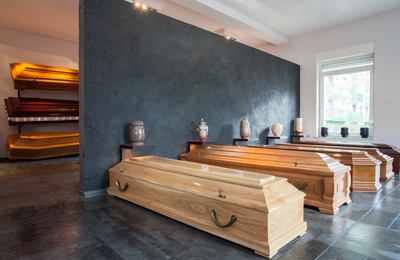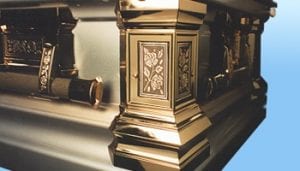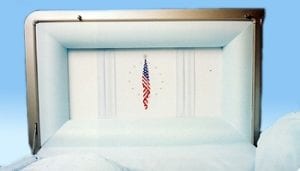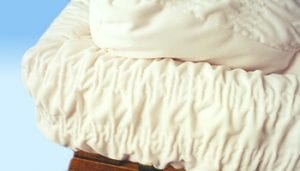Buying a Casket
What to Look for When Shopping for a Casket
Buying a casket is one of the most significant (and challenging) funeral products purchases you can make. They are big-ticket items with prices and features that vary widely. Fortunately, there are many beautiful selections in every price range.
When buying a casket, it is not always easy to tell exactly what the price includes. To make matters worse, you have to make this significant purchase at a time when you are extremely vulnerable, emotions are high, and you are under time constraints.
Your best defense against overspending is to shop in advance. Even when time is short, you can avoid some of the pitfalls that come with making such a significant purchase during a difficult and emotional time by learning as much as you can before you start shopping. Following a few basic steps will help the selection process go smoothly and ensure that you get the casket that suits your needs without an unnecessary burden on your finances.
BUYING A CASKET: STEP-BY-STEP
- Set a budget.
Caskets can cost from a few thousand dollars to tens of thousands. The best way to avoid overspending is to have a price range in mind before you start shopping. If you are buying from a funeral home, the funeral director is required to show you a price list before showing you the actual caskets. This will help you look at just those selections that are in the range you have in mind. Funeral homes are also required to accept caskets purchased from other providers.
- Think about your loved one’s wishes.
If you are shopping for a loved one who has left instructions on the type of casket they would prefer, then you will have that information to guide you. Often this is not the case. Thinking about the person’s personality and tastes will help you narrow down your choices on casket material, linings, and trim. If you are buying for yourself, then think about what is important to you regarding how you would like to be memorialized.
- Enlist a shopping companion.
When you start to shop, take along a friend or family member with whom you are compatible. Keep in mind that it is the funeral home’s job to guide you in selecting their products. Chances are you are working with an experienced, well-trained sales professional. That is not to say that they are trying to trick or deceive you.
Most funeral professionals are compassionate people who have your best interests at heart. However, they are also business people, and their job is to make money. For example, most funeral homes will show you the more expensive models first. These are the models that will be on display. You may have to request to see the lower-priced models. Having someone with you can help make it easier to request access to more information. Your companion may also think of things that you don’t. It is always helpful to talk over the pros and cons of particular models and features. - Take your time.
If you find yourself being overwhelmed, step back, and take a deep breath. Leave the showroom and clear your mind. Sometimes just taking a break can make all the difference.
- Check alternate providers.
Remember that you don’t have to buy the casket from the funeral home. There are many options these days. Independent retailers, big box stores such as Costco and Walmart, and online vendors all offer a wide selection of caskets and accessories. Funeral homes are required to accept these products without charging you an extra fee. You do need to be aware of delivery charges. Still, many people find the cost when buying from outside the funeral home can be cheaper–even with the delivery fee.
- Know your rights.
As a buyer, you do have rights. Rules and regulations regarding sales of funeral products can vary by state. There are also federal laws designed to prevent you from being pressured into buying items you don’t want. The Funeral Rule, enforced by the FTC, requires that funeral homes provide you with transparent pricing.
- Ask questions.
A reputable provider will not pressure you or make you feel uncomfortable when asking questions. If for any reason you think that you are being taken advantage of, pressured into buying particular items, or not being provided with accurate information, leave and look for another provider.
Types of Caskets
The material used in constructing the casket is a critical component in the cost. The most commonly used materials are metal and wood. Hardwoods, such as mahogany and walnut, while beautiful, are among the most expensive. More commonly found softer woods such as pine and poplar are generally less costly. Among the metals, bronze is typically the most costly, followed by copper. Stainless steel is usually the most economical choice. Besides traditional wood and metal, alternatives such as wood covered in cloth and wood veneers are available. New options such as fiberglass and plastic are starting to become more widely available.
Metal Caskets
Metal caskets are typically are more durable than those made of wood. You sometimes see metal caskets referred to in merchandising as “protective.”.
Metal caskets typically use a rubber gasket to seal the casket to help prevent outside elements from entering. The gasket does not slow down the decomposition process. You may be able to reduce the cost of the casket by eliminating the gasket or choosing a casket that does not require a gasket. Wooden caskets do not use a gasket.
Bronze and copper are the most durable metals and are non-rusting. They will, over time, oxidize, but in general, they are considered to be the most long-lasting. Bronze and copper are measured by weight per square foot. Therefore, a 48-ounce copper casket is 50% heavier than a 32-ounce model. Bronze and copper caskets are generally the most expensive.
Stainless and carbon steel are less expensive and come in different gauges of thickness, usually 16- 18- and 20-gauge. The smaller number is thicker and heavier, therefore, 16-gauge steel is thicker than 20-gauge.
Hardwood caskets are made of solid wood, such as mahogany, walnut, cherry, maple, oak, pecan. Pricing is much like that of solid wood furniture. Harder woods, such as mahogany, walnut, and cherry, are at the high end. Other woods such as pine, poplar, and willow are generally the most affordable. Mid-range materials include oak, birch, and maple.
A less expensive alternative to solid hardwood is wood veneer. Cloth-covered fiberboard and pressed wood are the least expensive caskets.
Casket Size
For some people, the size of the casket can be a concern. The length is rarely an issue but the width can be. A standard casket is generally 84 inches long, 28 inches wide, and 23 inches tall. These sizes can vary depending on the model so be sure to ask for specific dimensions. For the average-sized person, this is generally plenty of space. If the deceased is somewhat larger than average, you may need to look at an “oversized” casket. These larger caskets come in a variety of widths with 31 inches being common.
Choosing Features When Buying a Casket
Casket Lids
Caskets come in two basic lid types, half couch and full couch. Half Couch refers to a two-piece lid of equal lengths. Typically only one lid piece is opened for viewings to reveal the deceased from the waist up. A half-couch is the most common lid style.
Full Couch refers to a one-piece lid extending the length of the casket.
Casket Lining Materials
You have a variety of choices when it comes to the interior of the casket. The most popular choices are satin, velvet, and crepe but you may also choose from velour or linen. Velvet is among the most expensive fabric choices, crepe among the most economical.
The interior fabric of the casket is installed in a variety of ways. The most common choices are ruffled, tufted, or tailored. You can select almost any color. There are also specialty interiors available. You can choose from various custom options that reflect the deceased’s love for a particular sports team, hobby, rock group, or other interest. Of course, the greater the customization, the higher the cost.
Special Casket Features
Memory drawers are a “hidden” compartment in the lid of the casket. It is usually a small drawer where you place small personal items to accompany the deceased. Items left in the drawer after funeral services are buried with your loved one.
Other Casket Options
 Caskets are available in a variety of shapes such as square or rounded corners and contoured sides. With certain models, you can choose “casket corners” that attach to the corners of the casket. Casket corners are a thoughtful way to reflect the life of the person, whether it is a symbol of a favorite hobby like golfing or fishing, or a symbol of public service such as a firefighter.
Caskets are available in a variety of shapes such as square or rounded corners and contoured sides. With certain models, you can choose “casket corners” that attach to the corners of the casket. Casket corners are a thoughtful way to reflect the life of the person, whether it is a symbol of a favorite hobby like golfing or fishing, or a symbol of public service such as a firefighter.
 There are a variety of embroidered head panels and other customization available. Be sure to keep your budget in mind since many options will add to the cost of your casket. Casket lid inserts or cap panels are a way to make the casket unique to the person. Personalized designs, such as Military style, are readily available. Designs can be custom ordered and produced within a few days.
There are a variety of embroidered head panels and other customization available. Be sure to keep your budget in mind since many options will add to the cost of your casket. Casket lid inserts or cap panels are a way to make the casket unique to the person. Personalized designs, such as Military style, are readily available. Designs can be custom ordered and produced within a few days.
Choosing a Casket Provider
- FUNERAL HOMES: The most convenient way to buy a casket is through the funeral home handling your arrangements. When you buy from a funeral home, you are protected by something called The Funeral Rule. This law requires the funeral home to provide you with a price list before you see sample caskets. You have the right to look at only those products that fit your budget. To learn more protections for casket buyers under The Funeral Rule, click here.
- THIRD-PARTY RETAILERS: By law, funeral providers must accept caskets from third-party retailers. If your local area has a stand-alone casket showroom unaffiliated with the funeral home, you can purchase a casket through this company. These sellers do not fall under The Funeral Rule.
- ONLINE: In recent years, it has become easier than ever to purchase caskets from online retailers. Big-box stores such as Costco and Walmart now sell caskets online, and there are dozens of national online casket providers. Be aware that you’ll probably have to pay a delivery fee, but many people find that buying online saves considerable money and reduces stress. To learn more about how to buy a casket online, click here.
Caskets for Cremation
When choosing a casket for cremation, many of the same considerations for a burial casket apply. The key difference is that a casket for cremation must not have metal parts–it must be totally combustible. Unless you would like a casket because you have a funeral before the cremation, you don’t have to have a casket at all. Instead, you can have what is called an alternative container.
To learn more about cremation caskets and alternative containers, visit our page on Cremation Caskets.
There are three basic choices when it comes to purchasing a casket: a funeral home, a casket retailer, and an online provider. There are advantages and disadvantages to each. Which one is right for you will depend on your personal preferences and the resources available in your area.
Consumer Protection
Laws and regulations for funeral products can vary state-by-state. There is, however, the federal government has provided for consumer protection for casket buyers under The Funeral Rule.
The Funeral Rule is a law that is enforced by the Federal Trade Commission (FTC). Its purpose is to help ensure that consumers purchase only the funeral goods and services they really want. The rule applies to purchases made in advance and those made when you need them right away.
The key elements of The Funeral Rule include the right to:
- Buy only the funeral arrangements you want.
- Get price information on the telephone.
- Get a written, itemized price list when you visit a funeral home.
- See a written casket price list before you see the actual caskets.
- See a written outer burial container price list.
- Receive a written statement after you decide what you want before you pay.
- Get an explanation in the written statement from the funeral home that describes any legal cemetery or crematory requirement.
- Use an “alternative container” instead of a casket for cremation.
- Provide the funeral home with a casket or urn you buy elsewhere.
- Make funeral arrangements without embalming.
Click to view the entire FTC Funeral Rule
Several key elements of The Funeral Rule apply to buying caskets. One very important element is the fact that you are entitled to see a written price list BEFORE seeing the actual caskets. This enables you to ask to see only those caskets which are in the price range you have in mind.
The Funeral Rule does not apply to third-party dealers or monument companies or to cemeteries that do not have an onsite funeral home.
Here are the top three things you need to know about The Funeral Rule as it applies to purchasing a casket.
- Funeral service providers must provide you with a listing of casket prices either along with the price list for other services or in a separate price list BEFORE you look at the caskets. It is not enough for prices to be displayed with the caskets that are in the showroom.
- According to the FTC website, the Casket Price List (CPL) must include the following information:
- The name of the business
- The caption “Casket Price List”
- The effective date for the CPL
- The retail price of each casket or alternate container with enough information to specifically identify each casket.
- The information must include enough detail that you understand what you are buying. Only caskets that are usually offered for sale must be included. The CPL does NOT have to include information for caskets that require special ordering. The information on caskets does not have to be listed in any particular order or format. Photographs, manufacturer information, and model numbers may be included but are not considered to be enough information to describe the casket or alternative container.


